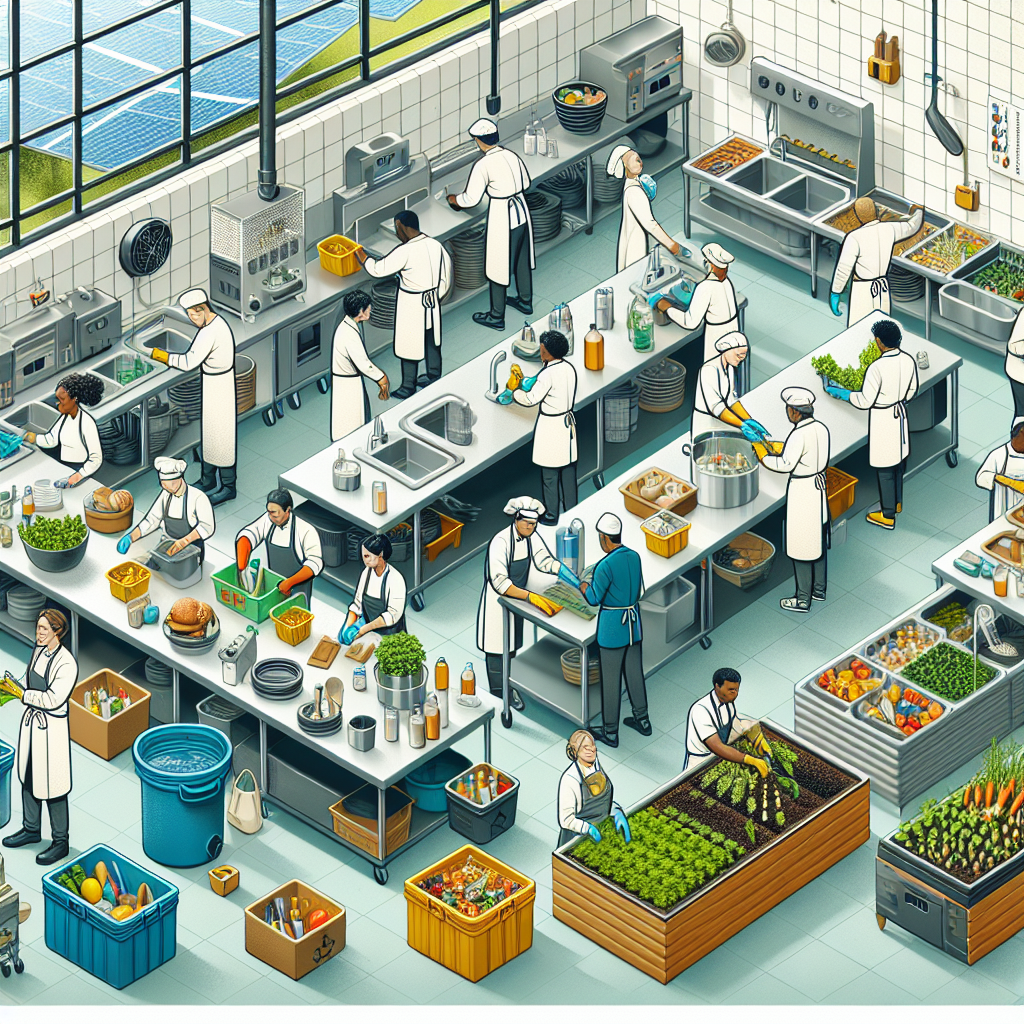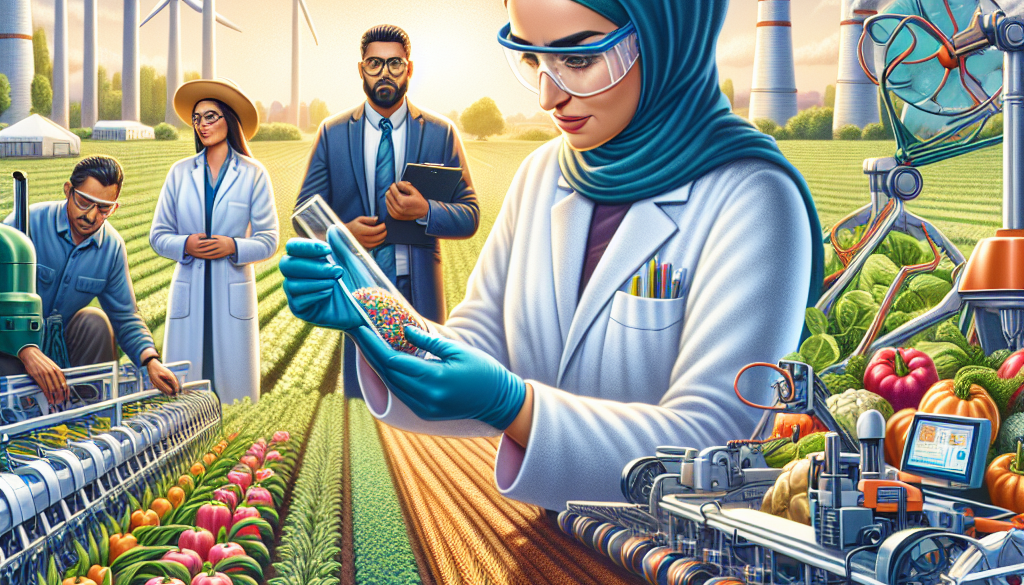Maximizing Productivity in Food Safety with Sustainable Practices
-
Table of Contents
- Maximizing Productivity in Food Safety with Sustainable Practices
- The Importance of Sustainable Food Safety Practices
- Strategies for Sustainable Food Safety
- 1. Embracing Technology and Innovation
- 2. Reducing Food Waste
- 3. Conserving Water and Energy
- 4. Sourcing Sustainably
- 5. Educating and Training Staff
- Case Studies and Statistics
- Challenges to Sustainable Food Safety
- Conclusion: The Future of Food Safety is Sustainable
- ETprotein: Your Partner in Sustainable Protein Solutions
Maximizing Productivity in Food Safety with Sustainable Practices

Ensuring food safety is a critical aspect of the food production and distribution industry. It is not only a matter of public health but also a significant factor in the economic viability of food businesses. However, as the world moves towards sustainability, it becomes imperative to align food safety practices with environmentally friendly methods. This article explores how companies can maximize productivity in food safety while adhering to sustainable practices, thereby contributing to a healthier planet without compromising on the quality and safety of food products.
The Importance of Sustainable Food Safety Practices
Food safety and sustainability are two sides of the same coin. While food safety aims to prevent contamination and ensure that food is safe for consumption, sustainability focuses on meeting current needs without compromising the ability of future generations to meet theirs. The integration of these two concepts is essential for the long-term success of the food industry.
- Reduction of waste and resource consumption
- Minimization of the carbon footprint of food production
- Enhancement of food security and local economies
- Improvement of public health outcomes
Strategies for Sustainable Food Safety
Implementing sustainable practices in food safety requires a multifaceted approach. Here are some strategies that can help businesses achieve this goal:
1. Embracing Technology and Innovation
Advancements in technology have paved the way for more efficient and sustainable food safety practices. For instance, blockchain technology can be used to enhance traceability in the supply chain, allowing for quick identification and response to food safety issues. Similarly, IoT (Internet of Things) sensors can monitor storage conditions to prevent spoilage.
2. Reducing Food Waste
Food waste is a significant issue that contributes to environmental degradation. By implementing better inventory management and adopting practices like composting, businesses can reduce waste and improve sustainability.
3. Conserving Water and Energy
Water and energy conservation are critical in sustainable food safety practices. Techniques such as rainwater harvesting, energy-efficient equipment, and optimized cleaning processes can significantly reduce resource consumption.
4. Sourcing Sustainably
Choosing suppliers who practice sustainable farming and production methods can have a profound impact on the overall sustainability of the food safety process. This includes supporting local producers and using organic or non-GMO products.
5. Educating and Training Staff
Employees are at the forefront of implementing food safety practices. Providing them with proper training on sustainability can help ensure that these practices are carried out effectively.
Case Studies and Statistics
Several studies have shown the benefits of integrating sustainability into food safety. For example, a report by the Food and Agriculture Organization (FAO) indicated that sustainable practices could lead to a 20% reduction in food waste. Additionally, a study by the World Resources Institute found that sustainable farming practices could increase crop yields by up to 30%, thereby improving food security.
Challenges to Sustainable Food Safety
While the benefits are clear, there are challenges to implementing sustainable food safety practices:
- Lack of awareness and education among stakeholders
- Initial costs associated with adopting new technologies
- Resistance to change within organizations
- Regulatory hurdles and compliance issues
Overcoming these challenges requires commitment from all levels of the food industry, from policymakers to individual businesses.
Conclusion: The Future of Food Safety is Sustainable
In conclusion, maximizing productivity in food safety through sustainable practices is not only beneficial for the environment but also for the economic health of food businesses. By embracing technology, reducing waste, conserving resources, sourcing sustainably, and educating staff, companies can ensure that their food safety measures are productive and sustainable. The future of food safety lies in the integration of these practices, leading to a more resilient and responsible food industry.
ETprotein: Your Partner in Sustainable Protein Solutions
As the food industry evolves, the demand for sustainable protein sources is on the rise. ETprotein is at the forefront of this movement, offering a range of high-quality, organic bulk vegan proteins and L-(+)-Ergothioneine (EGT) that cater to the needs of a sustainable food system. Their products, including Organic rice protein, pea protein, and various seed proteins, are non-GMO, allergen-free, and characterized by a neutral taste, making them ideal for a variety of applications in the food and beverage industry.
ETprotein’s commitment to sustainability and food safety is evident in their production processes and the purity of their products. By choosing ETprotein, businesses can ensure that they are not only providing safe and nutritious products but also contributing to a more sustainable food system.
About ETprotein:
ETprotein, a reputable protein and L-(+)-Ergothioneine (EGT) Chinese factory manufacturer and supplier, is renowned for producing, stocking, exporting, and delivering the highest quality organic bulk vegan proteins and L-(+)-Ergothioneine. They include Organic rice protein, clear rice protein, pea protein, clear pea protein, watermelon seed protein, pumpkin seed protein, sunflower seed protein, mung bean protein, peanut protein, and L-(+)-Ergothioneine EGT Pharmaceutical grade, L-(+)-Ergothioneine EGT food grade, L-(+)-Ergothioneine EGT cosmetic grade, L-(+)-Ergothioneine EGT reference grade and L-(+)-Ergothioneine EGT standard. Their offerings, characterized by a neutral taste, non-GMO, allergen-free attributes, with L-(+)-Ergothioneine purity over 98%, 99%, cater to a diverse range of industries. They serve nutraceutical, pharmaceutical, cosmeceutical, veterinary, as well as food and beverage finished product distributors, traders, and manufacturers across Europe, USA, Canada, Australia, Thailand, Japan, Korea, Brazil, and Chile, among others.
ETprotein specialization includes exporting and delivering tailor-made protein powder and finished nutritional supplements. Their extensive product range covers sectors like Food and Beverage, Sports Nutrition, Weight Management, Dietary Supplements, Health and Wellness Products, and Infant Formula, ensuring comprehensive solutions to meet all your protein needs.
As a trusted company by leading global food and beverage brands and Fortune 500 companies, ETprotein reinforces China’s reputation in the global arena. For more information or to sample their products, please contact them and email sales(at)ETprotein.com today.












